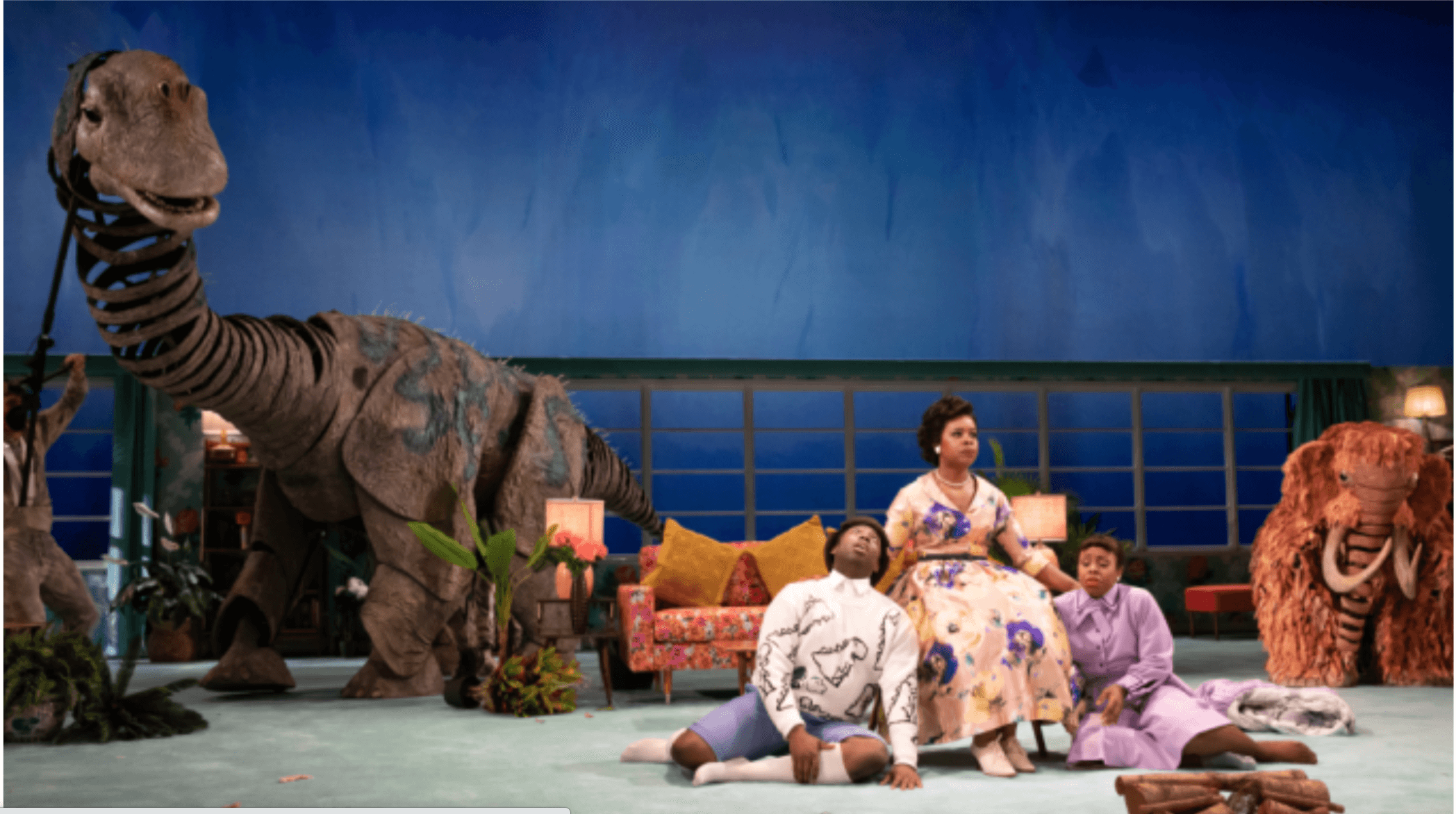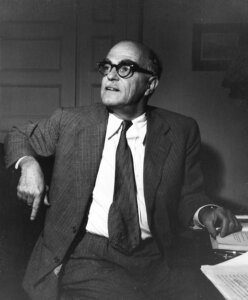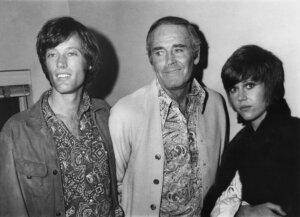He wasn’t Jewish, so why does Thornton Wilder seem so rabbinical?
125 years after his birth, the playwright is the subject of renewed attention with a revival of ‘The Skin of Our Teeth’

A scene from the Lincoln Center revival of Thornton Wilder’s ‘The Skin of Our Teeth’ Photo by Julieta Cervantes
Though Thornton Wilder was not Jewish, he claimed a distant Jewish link in his family tree. “Thank God I have some drops of Jewish blood,” he once wrote, referring to his great-great grandfather who was born Jewish and converted to Christianity. Still, from the moment I started reading his plays and novels in high school, I thought of him as a rabbinic commentator extraordinaire.
This notion struck me full force once again at the current Lincoln Center Theater production of “The Skin of Our Teeth,” a lively reboot of Wilder’s 1942 absurdist allegory of human and biblical history envisioned as an unending cycle of world-ending cliff-hangers which we must keep on escaping, again and again, just like Job (as described in Job 29:20) by the skin of our teeth.
This production, which plays through May 29, is part of a yearlong celebration of Wilder’s 125th birthday. Over the course of the play’s three acts — each one a mash-up of eras both historical and mythical — we witness the Antrobus family (the name derives from the Greek word for human) of Excelsior, New Jersey, struggle through timeless disasters that seem surrealistically relevant for today. Refugee crisis? Check. Climate change? Yup. Ravages of both civil and total world war? Say your prayers.

Wilder, who wrote the play at the start of World War II, didn’t foresee our current situation so much as re-imagine the ongoing story of humanity in the language of legend, and allow us to see it, anew, through the medium of theater. And that vision sheds new — and old — light on biblical stories themselves.
As the Ice Age descends in Act I, for instance, the Antrobus home becomes a makeshift shelter for all manner of strangers seeking refuge, including Judge Moses, who carries a pair of stone tablets and recites the opening verses of Genesis, in Hebrew. In Act II, as a destructive deluge descends on a raunchy, corrupt Atlantic City, the Noah-like George Antrobus guides his family and pairs of animals onto a nearby ark.
In Act III, the Antrobus family warily regroups in the aftermath of a devastating war that has pitted the forces of father George Antrobus against his son Henry (originally named Cain), a family civil war resonant of King David and the revolt of his son Absalom. Except in Wilder’s play, father and son reconcile and the family bands together to figure out, yet again, how to adapt, persevere, and uncover the necessary resilience to start again — and keep on starting again, in every epoch.
As Wilder wrote in a letter in 1927: “It seems to me that my books are about: what is the worst thing that the world can do to you, and what are the last resources one has to oppose it. In other words: when a human being is made to bear more than human beings can bear — what then?”
To me, this is a theological question posed by all religions: How do we continue onward even when we think we can’t? And it is also, to my mind, a query pertinent to the long arc of Jewish history — a saga filled with the uncertainties of life and death, faith and doubt, hope and despair. As in “The Skin of Our Teeth,” we are part of a continuum of catastrophe averted, but only temporarily, until the next cycle begins. Thus the world turns, no less in Wilder’s worldview than in the annals of Jewish endurance.
Still, if the near misses of global ruin are as central to “The Skin of Our Teeth” as are the close calls threatening the end of Jewish civilization that we’re reminded of each year at Passover and Purim, this is not the only theme in Wilder’s work that also resonates in a Jewish key.
Yes, 1927’s “The Bridge of San Luis Rey” is set in 1714 against the repressive backdrop of the Spanish Inquisition in Peru and one of its main characters is Franciscan friar Brother Juniper. But the friar is driven by a modern quest — or, more precisely, a questioning of God. After he witnesses the sudden collapse of an old rope bridge that plunges five seemingly insignificant people to their deaths, he is so shaken that he probes each one’s life history seeking to discover why God chose them. In other words, he dares to wrestle with God — a tradition long honored in Judaism, but one that was grounds for being burned at the stake during the Inquisition. Yet the survivors of the victims of the collapsed bridge ultimately do find their own way through grief to new meaning.
“There is a land of the living and a land of the dead and the bridge is love, the only survival, the only meaning,” the novel concludes. The echo of Rabbi Nachman of Braslav’s famous saying, “The whole world is a very narrow bridge, but the important thing is not to fear at all,” is inescapable. And so is the knowledge that any Jew espousing such a notion during the Inquisition would have faced the same fate as Brother Juniper.
Wilder’s 1931 one-act play “The Long Christmas Dinner” can also be seen as having a Jewish aspect — that is, if youa simply swap the title’s Christmas Dinner” for “Passover Seder.” Whatever the holiday, the ritual meal is presented in fast-forward motion, with several generations and 90 years of a single family compressed into a mere three-quarters of an hour on stage. It is a bravura collage of the continuity of time passing and people aging, with the baton of custom smoothly handed off through a near century of family continuity. What better dramatization of the Jewish notion of generation to generation in a never-ending cosmos?

On the surface, Wilder’s best-known play, “Our Town” (1940), tells the ordinary story of ordinary families in an ordinary New England town, Grover’s Corners, New Hampshire, over the course of a dozen years, starting in 1901. But that ordinariness is deceptive, by design. Wilder describes his central theme in the form of a question: “What is the relation between the countless ‘unimportant’ details of our daily life, on the one hand, and the great perspectives of time, social history, and current religious ideas, on the other?”
Perhaps in search of an answer, the play’s characters gaze at the multitudinous stars in the sky with awe and wonder, and the living and the dead strive, without success, to commune with one another. The message that the deceased wish to convey to the living is simple: that though it is impossible to pay full attention to every single moment of life, neither must one sleepwalk through life. As one character asks in the play’s final act, “Do any human beings ever realize life while they live it? — every, every minute?” How can that line not evoke the words of Maimonides, who demanded that we hear the piercing sound of the shofar at each Jewish New Year as a call to “Wake you sleepers from your sleep, you slumberers from your slumbers?”
Which brings us back to the rabbinic wisdom of Thornton Wilder and “The Skin of Our Teeth.” Over the decades, commentators have consistently emphasized both the timeliness and the timelessness of Wilder’s work. That is because, I believe, Wilder’s insistence on resilience in the face of struggle and uncertainty is the secular equivalent of a core Jewish message: to choose life — even if, and perhaps especially, when you’ve just escaped disaster by the skin of your teeth.



















